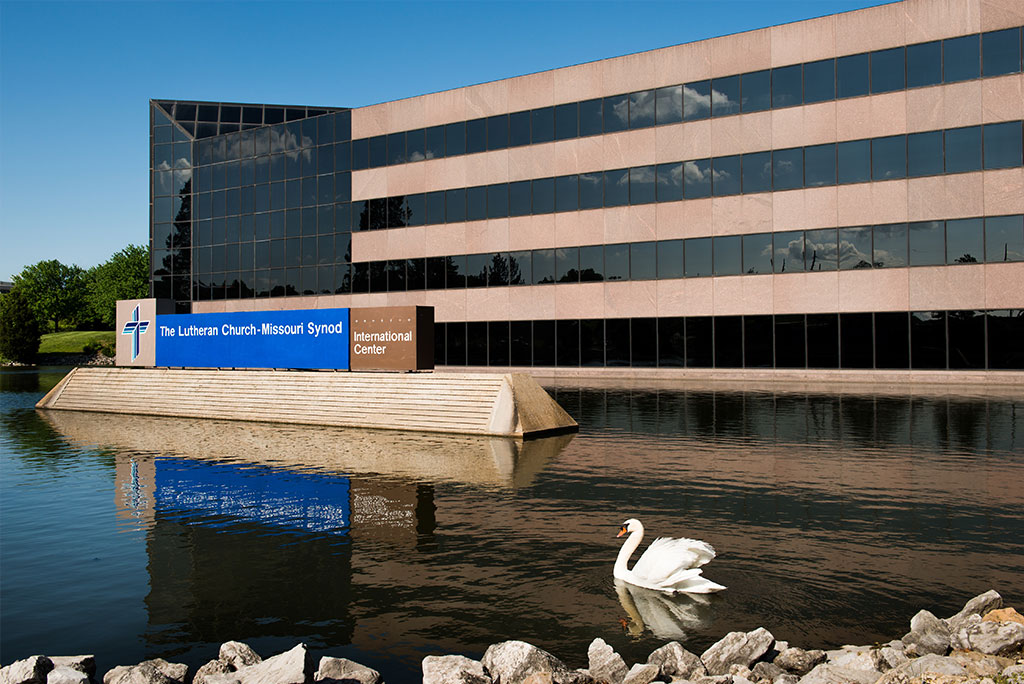
By Roger Drinnon
ST. LOUIS — Meeting here Feb. 16–17, the LCMS Board of Directors (BOD) weighed a number of opportunities and issues on which the LCMS is making steady progress, due to ongoing compassionate support from people across the Synod.
Donor generosity in wake of disasters
LCMS President Rev. Dr. Matthew C. Harrison noted the more than $9 million donated for hurricane and disaster relief, over $8 million of which is either “out the door” or planned for allocation within the next three years. The donations will help sustain long-term recovery efforts for victims of recent natural disasters, particularly those affected by hurricanes Harvey, Irma and Maria.
The LCMS continues working closely with all affected districts, with the districts taking the lead, to ensure the funds are being used to meet local disaster response needs.
Of note, $1.3 million has been devoted to hurricane recovery in Puerto Rico, where two mercy centers have been purchased adjacent to LCMS congregations to support much-needed long-term recovery work.
Current revenues are ahead of expenses
Chief Financial Officer (CFO) Jerald Wulf reported on the beginning of the FY19 budget cycle and on the state of the Synod’s finances. Six months into the fiscal year, unrestricted and released revenues (those given for specific purposes where the work is currently underway) are $309,241 ahead of expenses — a significantly positive situation, given the shortfall last year at this time. Total revenues, including permanently and temporarily restricted funds, are ahead of expenses by $4.4 million.
“The good news is that [charitable donors from across] the Synod remain enormously supportive,” said Harrison. “It’s a humbling trust.”
Targeting long-term deficit issue
Wulf highlighted the Synod’s undesignated, unrestricted net assets, a measure of corporate Synod’s financial flexibility. Except for partial recoveries from 2004–05 and 2010–14, this accounting category has reflected a generally growing deficit since 1999 (the last year without such a deficit), indicating that applicable gifts have generally not kept up with planned work.
Deficit growth since 2014 has largely occurred because of the increase in the number of international missionaries following the 2013 LCMS convention’s decision to double the number of career missionaries (Res. 1-11), and because restricted giving to support the work of our missionaries has not kept up with projected budgets.
While support networks have generally covered the missionaries’ costs, the funds needed to support their activities in the field have fallen short, resulting in the need to draw substantially on corporate Synod’s unrestricted revenue.
After significant belt-tightening in the first half of this fiscal year, the undesignated, unrestricted net-asset deficit stands at $12 million — an improvement from $13.6 million at the end of last fiscal year. Planning for FY19 will continue to address this deficit, with the aim of increasing corporate Synod’s fiscal flexibility.
Harrison acknowledged the deficit as “a historical, long-term issue” for the Synod that will take everyone, working together, to address.
Board members acknowledged that this will be the aim of changes coming to the Synod’s financial reporting process. A thorough, external review of the Synod’s accounting program was also arranged by the Board.
Other highlights of the meeting included reports from the Rev. Dr. Gregory Seltz, executive director of the Lutheran Center for Religious Liberty (LCRL), and from the Rev. Dr. Dean Wenthe, president of Concordia University System (CUS).
Higher education culture change
During his presentation to the Board, Wenthe explained how the overall culture of higher education in America is “stressed,” and how competition with smaller, enrollment-dependent educational institutions is ever-increasing, noting that more states are looking to provide free education.
He also reported that, in this challenging environment, the CUS schools are looking for efficiencies and new approaches going forward, while continuing to expand into new programs to remain competitive.
Fledgling Lutheran voice for religious liberty
Seltz reported on the LCRL’s opening and recent work and responded to various questions from the Board on some specifics of the Washington, D.C.-based center, current encroachments on religious liberty in America, and plans to cooperate in externals with other religious liberty groups. Seltz explained that the LCRL stands for religious liberty advocacy but not lobbying.
“[We must] put our temporal liberties to work so that Lutherans may preach the Gospel [freely] to the public,” he said.
During the meeting, the Board also met the Rev. Dr. Wilhelm Weber, new managing director of the International Lutheran Society of Wittenberg, Germany.
Harrison attending district conventions
With visits to the North Dakota and Southern Illinois district conventions complete, Harrison reported that he plans to attend 23 more of the 35 district conventions this year. Other members of the Praesidium, particularly First Vice-President Rev. Dr. Herbert C. Mueller Jr., will represent the president’s office at the other 10 district conventions.
“Time with district leadership, laypeople and pastors is very helpful and invigorating,” Harrison said.
Other actions
On the international front, the Board looked at how LCMS Church Relations and the International Lutheran Council are being challenged to accommodate the many Lutheran church bodies now interested in fellowship with the Synod.
Board members acknowledged LCMS Rosters, Statistics and Research Services’ work to produce insightful studies on young adults, including those who have left LCMS congregations, as well as information on the Synod’s largest congregations, recognizing that the Synod’s work to address member retention, outreach and congregational revitalization continues.
In other actions, the Board:
- concurred in the president’s reappointment of LCMS Chief Mission Officer Rev. Kevin Robson, who received the enthusiastic support of the Synod president and the Boards for National and International Mission to a new three-year term;
- made appointments to the LCMS National Housing Support Corporation (NHSC) Board of Directors and authorized the release of Board-designated funds for NHSC operations;
- authorized the purchase of land for, and construction of, a mission building in Belize;
- authorized estimates, for budget-planning purposes, of the salary and salary-range adjustments proposed by LCMS Human Resources to be made in the FY19 budget, while reserving the right to make adjustments as the budget process continues;
- responded — in some cases, by requesting further information — to myriad requests for authorization to finance and build or to adjust campus master plans for Concordia International School Hanoi; Concordia University Nebraska, Seward, Neb.; Concordia University, St. Paul, St. Paul, Minn.; Concordia University Wisconsin, Mequon, Wis.; and Concordia University, Ann Arbor, Mich.
The Board’s next meeting — May 18–19 in St. Louis — will focus on the FY19 budget.
Roger Drinnon (roger.drinnon@lcms.org) is director of Editorial and Media Relations for LCMS Communications.
Posted March 12, 2018
